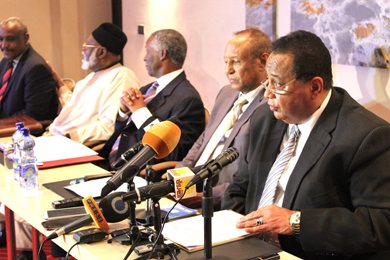AU proposes humanitarian truce, negotiations on Sudan’s Two Areas
February 23, 2014 (KHARTOUM) – The African Union High-Level Implementation Panel (AUHIP) proposed a cessation of hostilities and delivery of humanitarian assistance to civilians in Blue Nile and South Kordofan and asked the warring parties to negotiate a peaceful solution to end the nearly three year conflict.

During their meetings from 13 to 18 February, talks between the two delegations very quickly reached an impasse as the government says discussions should be limited to the conflict in the Two Areas while the SPLM-N says only a comprehensive process for all the conflicts in Sudan can bring peace.
The rebels also accused the government of omitting the framework agreement of 28 June 2011 which provides to hold a comprehensive process. On the other hand, the government claimed that the SPLM-N does not want to abide by the AU decisions and UN Security Council resolution 2046 (2012) which demand negotiations on the conflict in the two states and humanitarian access to the needy there.
In a bid to make it clear, the mediation submitted a “Draft Framework Agreement” where the two parties recommit themselves to a roadmap by the AU Peace and Security Council, and to UN resolution 2046 “which stipulate that the conflict in the Blue Nile and Southern Kordofan must be resolved by negotiations on the basis of the 28 June 2011 Framework Agreement” emphasises the proposed deal.
The draft, seen by Sudan Tribune, further provides that parties reaffirm their commitment to engage in talks to end the conflict in the Two Areas without prejudice to the broader dialogue and political process on the national level.
Based on these principles, the proposed framework which should be discussed within a week, says the parties would unconditionally cease hostilities in the two states, seven days after the signing.
Also, “the parties facilitate the immediate and safe delivery and movement of humanitarian assistance to all affected persons”.
The government and the SPLM-N, in line with the draft agreement, shall invite the AU to designate a body to serve as the Third Party with respect to the monitoring of the cessation of hostilities.
According to the proposed draft, a joint humanitarian committee, tasked with the assessment and delivery of aid in the two states, will be composed from 4 members from each party, plus a facilitator designated by the African Union. The parties will work “in the spirit of 4 and 5 August 2012 agreements”, further says the draft framework.
The SPLM-N and its allied rebel groups of the Sudanese Revolutionary Front (SRF), demand a comprehensive cessation of hostilities in the Two Areas and Darfur region. They also propose a comprehensive humanitarian access to all the needy in the rebel held areas in southern and western Sudan.
The draft framework, provides clearly that three political, security and humanitarian committees will focus on the resolution and implementation of these aspect of the conflict in the Blue Nile and South Kordofan states.
The proposed deal seems more like a re-read of the previous agreements and resolutions on the conflict in the Two Areas but it does not include new elements.
The Sudanese government, which seeks dialogue with political opposition parties inside the country, says rebels have to sign peace agreements and lay down their arms before to participate in a comprehensive process on constitutional reforms.
The SPLM-N and other SRF rebels say they do not trust the regime and accuse it of dishonouring signed peace deals. They point out that the holistic process will bring peace and democratic change because a national interim government would implement the resolutions of a national conference they call for.
In June 2013, the AU Peace and Security Council, rejected a demand by rebel groups in Darfur region and urged them to negotiate a peaceful settlement on the basis of the Doha Document for Peace in Darfur. The African body further called on Khartoum “to pursue a holistic approach to addressing these challenges within the framework of the on-going constitutional review process in an inclusive manner, with the support of and coordination with the AU High Level Implementation Panel (AUHIP)”.
The conflict in the Two Areas forced over 200,000 people to move into refugees camps in the neighbouring South Sudan. UN agencies estimate that there are some 77,300 refugees from Nuba Mountains of South Kordofan and 123,900 from the Blue Nile. Also some other thousands Sudanese refugees are in Ethiopia.
(ST)
